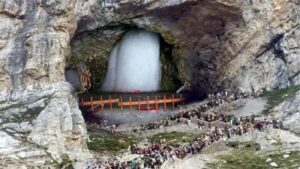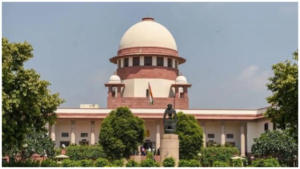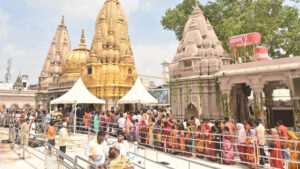All around the world Baháʼí communities commemorate 132nd Anniversary of the Ascension of Bahá’u’lláh, Prophet-Founder of the Baháʼí Faith on
on 13 ‘Azamat, 181 B. E. (Baháʼí Era) i. e. 28 May 2024 A.D.
On this day in 1892, Bahá’u’lláh (Supreme Manifestatiom of God) passed away, leaving behind all of His Writings and Bahá’u’lláh’s teachings, which Baháʼís commemorate and reflect on.
As per the newly implemented Bahá’í calendar, this year i. e. 2024 Bahá’í Naw-Ruz falls on March 20th. Therefore, this important holy day is celebrated on the 28th May, at 3 am.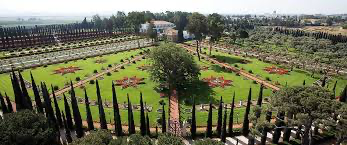
Bahá’u’lláh now lies buried in Bahji, in a shrine surrounded by a stunning garden, which is Bahá’u’lláh designed to symbolise the order of the world in the future.
Pilgrims to the Bahá’í shrines in Israel visit the tomb to pray there.
This solemn anniversary is a day of rest, and is often observed by reading or chanting from the scriptures.
The Ascension of Bahá’u’lláh — as it is called by Baháʼís — is a Holy Day for more than six million people in 192 countries and territories. It was the day when the Prophet-Founder of the Bahá’í Faith concluded nearly 40 years of a ministry and imprisonment that led Him as an exile through present-day Iran, Iraq, Turkey, Egypt, and finally to Akka, Israel, where He died under house arrest on May 29, 1892. The essence of His message was one of unity — that the world’s great religions all come from the same Source, and that the world’s peoples are part of the same human family
.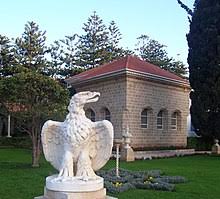
This Holy Day also serves as a reminder that in Iran, the land of the birth of the Baháʼí Faith Baháʼís still do not enjoy religious freedom and are the targets of persecution and oppression.
The commemoration of His passing is called ‘The Ascension of Bahá’u’lláh’, and Baháʼís throughout the world pay their respects with prayers and selected Baháʼí Writings. It is also one of the nine days in the Baháʼí calendar year, where work should be suspended.

For Baháʼís, the anniversary of Bahá’u’lláh’s passing is a time to remember His life of service, reflect on His suffering, and read His scriptures that span nearly more thsn 100 volumes.
For almost 40 years Bahá’u’lláh suffered imprisonment and banishment, originally from His birthplace in Persia (present-day Iran), to Baghdad, and then to the Ottoman cities of Constantinople, Adrianople, and then finally to the infamous prison city of Acre (in present-day Israel), where He was held in a cold and damp cell.
During the last years of His life, Bahá’u’lláh was held under house arrest in ‘The Mansion of Bahji’, which is outside the prison walls of Acre.
The Shrine of Bahá’u’lláh is located within the precincts of The Mansion of Bahji, and is considered to be the most sacred and holiest spot on earth for Baháʼís.
One of the most befitting descriptions relating to the ascension of Bahá’u’lláh was written by beloved Guardian of the Baháʼí Faith,
Shoghi Effendi in God Passes By:
“Already nine months before His ascension Bahá’u’lláh, as attested by ʻAbdu’l-Bahá, had voiced His desire to depart from this world. From that time onward it became increasingly evident, from the tone of His remarks to those who attained His presence, that the close of His earthly life was approaching, though He refrained from mentioning it openly to any one. On the night preceding the eleventh of Shavval 1309 A.H. (May 8, 1892) He contracted a slight fever which, though it mounted the following day, soon after subsided. He continued to grant interviews to certain of the friends and pilgrims, but it soon became evident that He was not well. His fever returned in a more acute form than before, His general condition grew steadily worse, complications ensued which at last culminated in His ascension, at the hour of dawn, on the 2nd of Dhi’l-Qádih 1309 A.H. (May 29, 1892), eight hours after sunset, in the 75th year of His age. His spirit, at long last released from the toils of a life crowded with tribulations, had winged its flight to His “other dominions,” dominions “whereon the eyes of the people of names have never fallen,” and to which the “Luminous Maid,” “clad in white,” had bidden Him hasten, as described by Himself in the Lawḥ-i-Ru’yá (Tablet of the Vision), revealed nineteen years previously, on the anniversary of the birth of His Forerunner.”
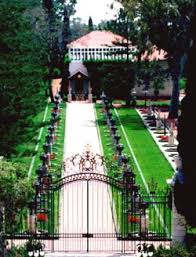
Six days before He passed away He summoned to His presence, as He lay in bed leaning against one of His sons, the entire company of believers, including several pilgrims, who had assembled in the Mansion, for what proved to be their last audience with Him. “I am well pleased with you all,” He gently and affectionately addressed the weeping crowd that gathered about Him. “Ye have rendered many services, and been very assiduous in your labors. Ye have come here every morning and every evening. May God assist you to remain united. May He aid you to exalt the Cause of the Lord of being.” To the women, including members of His own family, gathered at His bedside, He addressed similar words of encouragement, definitely assuring them that in a document entrusted by Him to the Most Great Branch He had commended them all to His care.
The news of His ascension was instantly communicated to Sulṭán ‘Abdu’l-Ḥamid in a telegram which began with the words “the Sun of Bahá has set” and in which the monarch was advised of the intention of interring the sacred remains within the precincts of the Mansion, an arrangement to which he readily assented. Baháʼu’lláh was accordingly laid to rest in the northernmost room of the house which served as a dwelling-place for His son-in-law, the most northerly of the three houses lying to the west of, and adjacent to, the Mansion. His interment took place shortly after sunset, on the very day of His ascension.
The inconsolable Nabil, who had had the privilege of a private audience with Baháʼu’lláh during the days of His illness; whom ʻAbdu’l-Bahá had chosen to select those passages which constitute the text of the Tablet of Visitation now recited in the Most Holy Tomb; and who, in his uncontrollable grief, drowned himself in the sea shortly after the passing of his Beloved, thus describes the agony of those days: “Methinks, the spiritual commotion set up in the world of dust had caused all the worlds of God to tremble…. My inner and outer tongue are powerless to portray the condition we were in…. In the midst of the prevailing confusion a multitude of the inhabitants of ‘Akká and of the neighboring villages, that had thronged the fields surrounding the Mansion, could be seen weeping, beating upon their heads, and crying aloud their grief.”
For a full week a vast number of mourners, rich and poor alike, tarried to grieve with the bereaved family, partaking day and night of the food that was lavishly dispensed by its members. Notables, among whom were numbered Shí’ahs, Sunnís, Christians, Jews and Druzes, as well as poets, ‘ulamás and government officials, all joined 223 in lamenting the loss, and in magnifying the virtues and greatness of Baha’u’llah, many of them paying to Him their written tributes, in verse and in prose, in both Arabic and Turkish. From cities as far afield as Damascus, Aleppo, Beirut and Cairo similar tributes were received. These glowing testimonials were, without exception, submitted to Abdu’l-Baha, Who now represented the Cause of the departed Leader, and Whose praises were often mingled in these eulogies with the homage paid to His Father.
Bahá’u’lláh, which means the Glory of God in Arabic, was born in 1817 into one of Persia’s most noble and privileged families.
In 1844, just 3 months after the Báb’s Declaration, Mulla Husayn carried a scroll of the Báb’s to Bahá’u’lláh.
On reading it, Bahá’u’lláh recognised the claims of the Báb and at the age of 27 became His follower.
From then on, although they never met, Bahá’u’lláh and the Báb were in constant correspondence and when the Báb knew that He would soon die, He sent His pens, seals and papers to Bahá’u’lláh.
It was at Bahá’u’lláh’s explicit instructions that the remains of the Báb were removed from Tabriz to Tihran and hidden in a place of safety.
Two years after the Báb’s death, Bahá’u’lláh was imprisoned in Tihran, accused of taking part in the attempted assassination of the Shah of Persia.
He was put in stocks and, for three days, given neither food nor water.
Other Bábis were imprisoned with Him and as they sat in chains, Bahá’u’lláh taught them to chant prayers which were heard by the Shah.
The reasons for Bahá’u’lláh’s arrest were not straightforward and included:
His stature and influence as the leading member of the Bábi community
the jealousy of the Grand Vizier the hatred of the Shah’s mother, who levelled unjust accusations at Bahá’u’lláh. Bahá’u’lláh’s own actions also contributed to His arrest:
He ignored advice to keep Himself hidden
He went of His own volition to army headquarters to be arrested
Bahá’u’lláh was jailed underground in a prison with a very significant name: the Siyáh-Chál, or Black Pit. It had previously been a reservoir for the public bath.
His experiences in this dreadful place have close parallels with the descendent of the Holy Spirit in the form of a dove on Jesus, the appearance of the Angel Gabriel to Muhammad in the cave on Mount Hira, and the enlightenment of the Buddha under the Bo tree.
The Bábis were often tortured and killed but the authorities were reluctant to kill Bahá’u’lláh.
This was partly because of his family’s influential social position, and partly because of a personal intervention by Prince Dolgorukov, a Russian ambassador.
The Prime Minister of Persia decided that it was preferable for Bahá’u’lláh to be banished from the state and He was released from prison in 1853. He was stripped of His wealth and possessions and travelled to Baghdad with His wife.
While in prison, Bahá’u’lláh had a vision of the ‘Most Great Spirit’ in the form of a heavenly maiden who assured Him of His Divine Mission and promised divine assistance.
Bahá’u’lláh Himself wrote that He had the feeling of something glowing from the crown of His head and of hearing words of protection and victory.
This is as significant for the Bahá’í revelation as the visitation of Gabriel which caused Muhammad such consternation, or the vision of God that caused Moses to swoon.
This event is regarded by Bahá’ís as marking the birth of the Bahá’í revelation. It stands at the heart of Bahá’u’lláh’s claim to be the Manifestation of God.
Essentially, Baháʼís remember this mournful day each year by focusing on Baháʼu’lláh’s life and teachings, and by bearing witness to the belief that Baháʼu’lláh’s spirit did not die, but has been released from earthly limitations by ascending to a higher realm.
The Tablets to the Rulers were written by Baháʼu’lláh between 1867 and circa 1873.
Six works comprising letters written by Bahá’u’lláh during His exile in Adrianople and the early years of His banishment to ‘Akká, addressed to the monarchs and leaders of His time, including Napoleon III of France, Czar Alexander II of Russia, Queen Victoria of England, Nasiri’d-Din Shah of Persia, and Pope Pius IX.
Beginning in 1867 in Adrianople and continuing later in ‘Akká, Bahá’u’lláh wrote to the kings and rulers of the world, including Emperor Napoleon III, Queen Victoria, Kaiser Wilhelm I, Tsar Alexander II, Emperor Franz Joseph, Pope Pius IX, Sultan Abdul-Aziz, and the Iranian ruler, Nasiri’d-Din Shah.
Shoghi Effendi explains that the proclamation was communicated “in books, Epistles, and Tablets”. Of the rulers listed in the extract from “The Promised Day is Come”, cited above, specific individual Tablet(s) were addressed to:
Napoleon III (2 Tablets)
Pope Pius IX
Czar Alexander II
Queen Victoria
Sultan ‘Abdu’1-‘Aziz
Nasiri’d-Din Shah.
In these Tablets (letters), Bahá’u’lláh openly proclaimed His station as a Messenger of God. He urged the rulers of world to pursue justice and disarmament and exhorted them to band together into a commonwealth of nations, warning them of the dire consequences should they fail to establish peace.
Bahá’u’lláh produced over 18,000 works in His lifetime, in both Arabic and Persian, of which only 8% have been translated into English.
“On 29 May 1892, after four decades of bountiful radiance, from the first intimation of its rising glory in the Siyah-Chal and Baghdad to its midday splendour in Adrianople and ‘Akka, the Sun of Bahá—as ʻAbdu’l-Bahá memorably relayed in His telegram informing Sulṭan ‘Abdu’l-Ḥamid of the ascension of Baháʼu’lláh—had set. Yet the setting of that Sun was not followed by the dark of night but by the reflection of its glory in the Moon of the Covenant, lighting the path ahead, towards the attainment of Baháʼu’lláh’s ultimate purpose: the unification of humanity.’
The Kitáb-i-ʻAhd, literally “Book of My Covenant” is the Will and Testament of Baháʼu’lláh, where He selects His eldest son ʻAbdu’l-Bahá as His successor. It was written at least one year before Baháʼu’lláh died in 1892.
Baháʼu’lláh created an explicit Covenant with Bahá’ís in His Will and Testament which was written entirely in His own hand and is known as the “Book of My Covenant”. It was unsealed and read before witnesses and members of his family on the ninth day after his death in 1892.
Baha’u’llah’s 75 years on this Earth had an astounding impact on humanity. As the founder of the newest global Faith, his three-quarters of a century here contained a remarkable number of both heroic and harrowing events.
Baha’u’llah lived through a sequence of immensely important roles: a Persian nobleman, a poet, a mystic, His country’s acknowledged and celebrated “Father of the Poor,” a prisoner of conscience, a torture victim, an exile, and above all, the Divine messenger who founded and promulgated the world’s second-most widespread religion, the Baháʼí Faith.
According to teachings, religion is revealed in an orderly and progressive manner by a single God through Manifestations of God, who are the founders of major world religions throughout history. The most recent of them, prior to Báb and Bahá’u’lláh, are Buddha, Jesus, and Muhammad. Despite differences in social practices and interpretations, Baháʼí Faith regards the major religions as fundamentally unified in purpose. The Baháʼí Faith emphasizes universal unity and outright condemns racism, misogyny, and nationalism. At the heart of Baháʼí teachings is the goal of a unified world system that promotes the prosperity of all nations, races, creeds, and classes.
Compiled by:-
Jaya Raju Thota
Greater Visakhapatnam
INDIA






